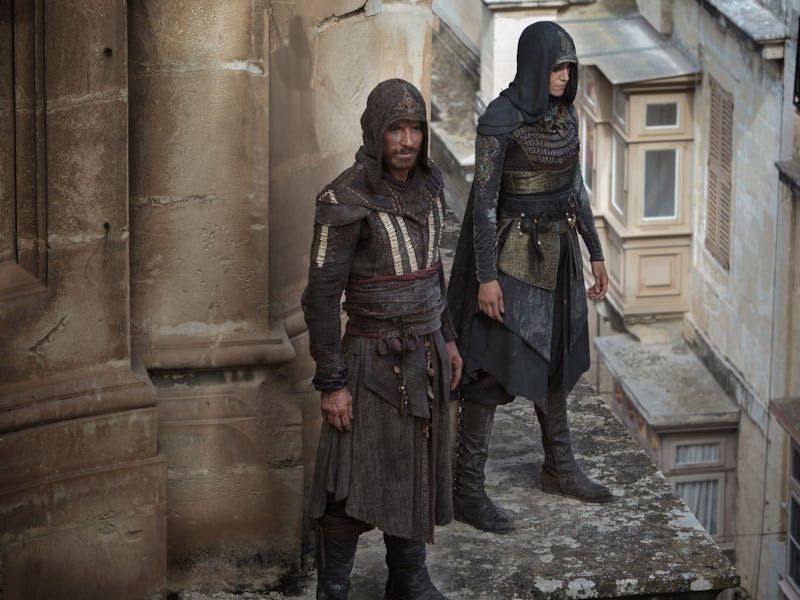When Nothing's True, Everything's Permitted in 'Assassin's Creed'
“What it’s saying is don’t believe anything. Challenge everything."

The gears for Assassin’s Creed, which stars Michael Fassbender as a quasi-time-traveling criminal, were in motion before director Justin Kurzel came aboard. So it wasn’t his decision for the film — half epic period fantasy, half modern sci-fi — to take place during the Spanish Inquisition, an era never seen in Ubisoft’s popular video game series. Nor was it his call to include characters Assassin’s Creed players hardly knew. (The film’s antagonist, Alan Rikkin played by Jeremy Irons, appeared as a silent background character in the original 2007 game.) But he was very happy with those calls; had Ubisoft wanted a straight adaptation, Kurzel says he wouldn’t have taken the job.
There were plenty of changes to the original story made after Kurzel (Macbeth, The Snowtown Murders) joined the production. One of the most prominent was a more visually dynamic “Animus”, the machine that enables subjects access memories that are encoded in their DNA. The science is beyond speculative, really more or less magic, but in the games the Animus resembled a lab process in The Matrix, in which characters lie prone in artificial sleep. Wanting more spice, Kurzel and his team modeled their Animus after virtual reality, allowing Callum to mimic his ancient ancestor when he jumps, rolls, and kills.
“I was interested in see the synchronicity of Callum with Aguilar,” says Kurzel, who wanted audiences to accept how Cal could learn Aguilar’s skills. The apparatus attached to Callum’s waist simulated a “virtual reality experience,” so when Cal climbs or jumps it could anticipate instincts. “At first it was quite complicated, but when we started allowing an audience to see these two merge as one, it started to feel successful,” Kurzel added.
Justin Kurzel, on the set of 'Assassin's Creed.'
The French discipline of urban free-running, parkour, is a staple from the games gave Assassin’s Creed another spectacle for the big screen. “There was something when you’re leaping and jumping [in the game] that feels humanly possible,” says Kurzel, which he loved about the games because it felt as though players were using their own instincts. “So we got the best stunt guys, best parkour, martial arts guys and brought them into a room and said, ‘What’s possible? What can we do? Can we do that leap?’”
That leap Kurzel refers to was a 125-foot drop, performed by veteran stuntman Damien Walters, who happens to be an avid fan of the games. “Damien was really keen. Most of the time they don’t get the opportunity to do [real jumps], just wiring on a green screen,” he said. “They were keen to see what were the limits to what you could physically do.”
It wasn’t just the human body that was tested. The sprawling, ancient city of Valletta, the capital city of Malta, where a significant portion of the film was shot, saw stuntmen performed on buildings more than 500 years old. “When you’re doing [stunts] for real on buildings that could at any time collapse, and you’re under serious time pressure, you’re always holding your breath when someone is risking an enormous amount to pull off a stunt for you,” admits Kurzel. “It was definitely the hardest aspect of the shoot.”
The titular assassin’s creed still means something to the Australian filmmaker, even now with the film in theaters. Kurzel, who won acclaim last year for his haunting vision of Macbeth, takes to heart the mantra of his movie: “Nothing is true, everything is permitted.”
“I find [it] really powerful,” Kurzel tells Inverse. “What it’s saying is don’t believe anything. Challenge everything. Don’t wear things because someone says so, or doesn’t like a film, or elect someone because they are told. Come up with your own self-realization. Be curious for yourself.”
Michael Fassbender as Callum Lynch in 'Assassin's Creed.'
After last year’s Macbeth, Kurzel took on the responsibility of bringing Ubisoft’s storied franchise to the big screen. The IP has the makings of a robust Hollywood franchise, but it’s not an exaggeration to say the majority of video game movies have been box office losers. Kurzel, who was “curious” why the genre routinely fails, took Assassin’s Creed on a leap of faith. Blockbuster filmmakers have entered an arms race for authenticity, which come in the shape of droids like BB-8 in Star Wars to free-falls from over a 125 feet in the air. Kruzel’s mission for legitimacy feels like it’s on behalf of the creed, where nothing might be true, but anything he can do to ensure it, is permitted.
“I think today, it’s a very important mantra,” Kurzel muses. “[It’s] something that I deeply connected to in terms of really understanding what free will is. It’s not an extreme idea. It’s actually about trusting one’s self and trusting one’s voice, and that is important. The choices we make, not what are given to us.”
Assassin’s Creed is now in theaters.